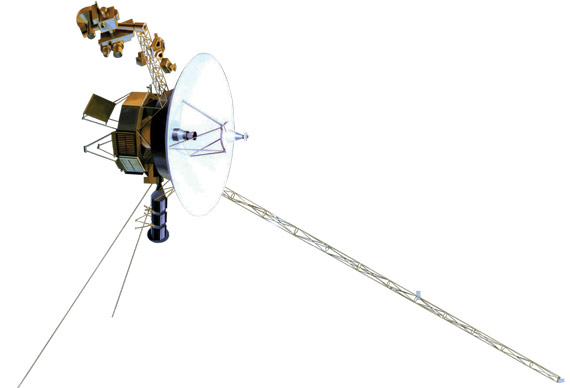Mirror mirror
 Deep space probes like Voyager could benefit from new discoveries in photovoltaic efficiency.Berkeley researchers led by Eli Yablonovitch, professor of electrical engineering and computer sciences, have broken another record in photovoltaic efficiency — an achievement that could lead to ultralight engines that power drones for days or deep space probes for centuries, as well as envelope-sized generators that power entire houses. In 2011, the researchers found that the key to boosting solar cell efficiency was not absorbing more photons, but emitting them. By adding a highly reflective mirror on the rear of a thin-film photovoltaic cell, which assisted the light extraction, they broke all solar efficiency records at the time and have continued to do so with subsequent research. Recently, the team recognized that this mirror could also solve one of the biggest challenges in thermophotovoltaics, converting thermal radiation to electricity, and exploit the thermal photons that have too little energy to produce electricity. It turns out that the mirror provides a second function, reflecting those small photons to reheat the thermal source, providing further opportunity for high-energy photons to be created to generate electricity. This insight has allowed researchers to raise the efficiency of converting heat into electricity by thermophotovoltaics from 23% to 29%, with the aim of reaching 50% efficiency in the near future.
Deep space probes like Voyager could benefit from new discoveries in photovoltaic efficiency.Berkeley researchers led by Eli Yablonovitch, professor of electrical engineering and computer sciences, have broken another record in photovoltaic efficiency — an achievement that could lead to ultralight engines that power drones for days or deep space probes for centuries, as well as envelope-sized generators that power entire houses. In 2011, the researchers found that the key to boosting solar cell efficiency was not absorbing more photons, but emitting them. By adding a highly reflective mirror on the rear of a thin-film photovoltaic cell, which assisted the light extraction, they broke all solar efficiency records at the time and have continued to do so with subsequent research. Recently, the team recognized that this mirror could also solve one of the biggest challenges in thermophotovoltaics, converting thermal radiation to electricity, and exploit the thermal photons that have too little energy to produce electricity. It turns out that the mirror provides a second function, reflecting those small photons to reheat the thermal source, providing further opportunity for high-energy photons to be created to generate electricity. This insight has allowed researchers to raise the efficiency of converting heat into electricity by thermophotovoltaics from 23% to 29%, with the aim of reaching 50% efficiency in the near future.

